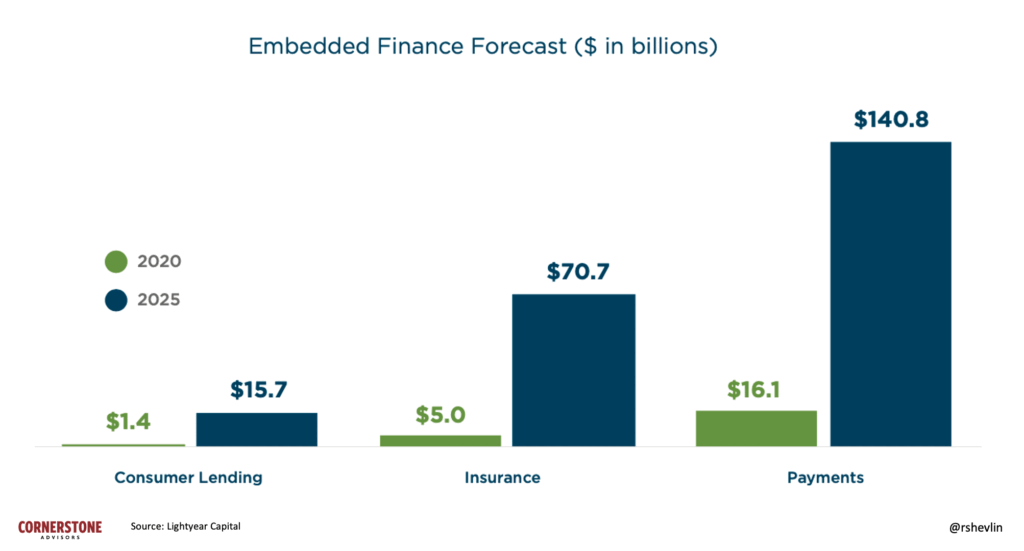
Fintech Enablers are Fueling the Growth of Embedded Finance
by Fintech News Singapore October 25, 2021Fintech “enablers” have exploded in growth and popularity in the last few years, bringing with them a new wave of innovation by democratizing financial services and expanding the fintech market opportunity.
Fintech enablers develop and provide cutting-edge technologies to various clients, allowing them to offer their own fintech services. Such platforms and solutions can be core infrastructure, customer onboarding solutions, or payments systems.
The growth of these companies has fueled trends such as embedded finance, where banking-like services are being offered by non-banks, as well as banking-as-a-service (BaaS), where banks themselves lease their infrastructure to various types of clients.
Today, these providers are powering some of the world’s fastest-growing consumer finance companies and digital banks, including Trade Republic, a German unicorn neobroker, Mynt, the lending arm of leading Filipino telco Globe Telecom, and TMRW, the digital banking offering of incumbent bank United Overseas Bank (UOB).
Venture capital (VCs) firms are seeing the value of modularizing banking and are pouring billion into startups in the space.
In India, small and medium-sized enterprise (SME)-focused neobanking platform Open raised US$100 million as part of its Series C funding round earlier this month. The company said it will use the proceeds to strengthen and accelerate its new product line, which includes its embedded finance platform Zwitch and cloud-native banking platform BankingStack. Currently, BankingStack is deployed across 15 Indian banks, the company said.
In Singapore, business-to-business (B2B) payments platform Nium raised a US$200+ million Series D funding round in July, reaching unicorn status. Through a single API, Nium provides access to payments infrastructure, including technologies for pay-outs, pay-ins, card issuance, and BaaS, allowing banks, payment providers, travel companies, and other businesses to embed financial services in a timely manner. Nium owns licenses in 11 jurisdictions and claims to be serving hundreds of enterprise clients.
Data provided to Reuters by PitchBook show that, so far this year, investors have poured US$4.25 billion into embedded finance startups, almost three times the amount of 2020.
Partnerships as a growth driver
The key to the growth of fintech enablers is partnership, a vital component that has allowed them to create better products and better services for consumers, financial institutions and SMEs, says a new paper by Amazon Web Services (AWS) Financial Services, the UK’s fintech trade group Innovate Finance and VC firm Finch Capital.
The paper, titled Fintech partnerships and the technologies that enable them, looks at the rise of fintech enablers and delves into the critical role collaboration is playing in the fast-evolving financial landscape.
As competition intensifies in the financial services industry and as bigtechs including Google, Apple and Facebook are rapidly entering the space, partnerships have become critical to stay ahead in the ever-so crowded market, the paper says.
By partnering with the best companies specializing in specific technologies or verticals, financial institutions, incumbents, and fintech startups can save time and resources, improve product time to market, enhance user experience and reduce the overall learning curve, it says.
In particular, partnerships allow them to meet several key strategic objectives such as gaining access to new or improved technology capabilities, and helping them improve digital customer experience.
This is done by leveraging white-label solutions or by tapping advanced infrastructure or software provided by top fintechs, allowing for immediate access to the latest cutting-edge technology, faster go-to-market as well as the ability to reach new customer segments without inhouse development efforts or risk. Fintech enablers in these categories include Swedish open banking startup Tink, and cloud-based banking technology specialists Thought Machine and Mambu.
Partnerships also enable non-bank providers as well as large, established brands to start offering financial services. Through embedded finance, these firms can add value to their customer base and access new monetization opportunities. Klarna, the world’s leading buy now, pay later (BNPL) platform, is a relevant enabler in this area, allowing merchants to offer installment payment plans and increase sales.
Private equity firm Lightyear Capital estimates that in 2020, embedded finance generated US$22.5 billion in revenue. That figure is projected to increase 10 times, surging to an estimated US$230 billion by 2025.

Embedded finance forecast SOURCE: LIGHTYEAR CAPITAL
Featured image:Technology photo created by rawpixel.com – www.freepik.com







